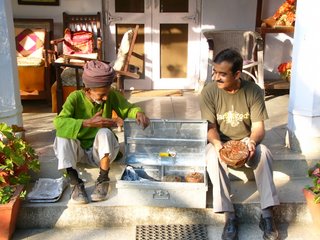Recipe for making homemade mozzarella cheese.Makes about 4 8oz balls
I N G R E D I E N T S2 gallons milk, pasteurized and cooled to 90F
7 tablespoons cultured buttermilk
6 tablespoons yogurt
Rennet to coagulate 2 gallons milk (1/2 Hansenstablet) dissolved in about
1/2 cup Cold water.
I N S T R U C T I O N S Mozzarella is one of several kinds of "plastic-curd" cheeses, originating in
Italy. In making them the curds are kneaded, which expels whey and produces
plasticity. Because of their dense texture they keep well in warm climates and
are ideal for smoking. Provolone is an aged version of a plastic-curd cheese.
Mozzarella is one of the most versatile cheeses to make at home,since it tastes wonderful freshly made, freezes well, and can be used like an
aged cheese incooking, melting readily when heated.
Start this cheese in the evening.
Maintain the milk at 90^F in a double boiler.
Mix the buttermilk and yogurt separately with a little of the milk to remove
lumps, then blend into the rest of the milk.
Add the rennet solution and mix thoroughly.
Let sit until the curd sets and breaks clearly when tested with a finger a
bout 20 to 30 minutes.
Cut the curd into 1/2 inch cubes as evenly as possible.
Maintain at 90^F for 15 minutes, stirring with a clean hand.
The curds are fragile because they have not been cooked,
so stir very gently,
just enough to keep them from matting together.
Gently pour the curds into a cloth lined colander.
When the whey has drained, the curd should be in one solid piece.
Rinse in
cold water, then soak in a pan of
cold water for 15 minutes.
If it is a big batch, cut the curd into several blocks, 4 or 5 inches square.
Drain off most of the water, then
refrigerate the curds, or keep in a cool, 40^F place.
Leave them in a
colander or other container that allows
drainage.(Commercially, mozzarella curds are shipped to delicatessens at this stage, where the cheese is finished.)
The next day, warm the cheese to room temperature so it will ripen, or
become more acidic.
After an hour or so, test the cheese for acidity as follows :-
Cut off a small piece of cheese and cut it into three 1/2 inch cubes.
Heat several cups of water in a sauce pan to 165^F.
Put in the cubes and stir for 5 minutes.
Remove the cubes and mold them together like modeling clay.
Reheat the lump of cheese in the water
for a minute, then remove and
work or mold it together a little more.
After repeating several times, try to pull the curd apart.
If it breaks or tears, and clouds the water, it is
under-ripe.
Wait an hour or so and test again.
When it pulls into a long rope and can be molded together again,
it is ready.
It will have a glossy surface and* will cloud the water only slightly.
The whole cheese is treated somewhat like the test sample to finish it.
Cut it into small cubes and put them in a pan.
Heat water to 170^F and pour enough over them, to cover the curds
by about 2 inches. Keep a thermometer in the pan and
let the temperature drop to 135^F.Press the cubes together, and then
knead the cheese, by stretching
and pulling it, as if working modelling clay.
It should become "plastic" and stretch into long strands.
When it does, shape into half pound balls, or make a thick rope, fold
it in half, and twist several times to make a decorative oblong cheese.
Mozzarella can be dipped in hot water to make a
glossy surface,
or wrapped in cheese cloth to protect it.
To keep the cheese very
fresh tasting for up to a week, keep it
in a bowl of water in the refrigerator, and
change the water every day.
To salt mozzarella
for longer keeping, or to prepare it for smoking,
soak it in
brine for 4 or 5 hours (
See Brined Cheese) The whey from
mozzarella is perfect for making
ricotta because it does not have a chance
to develop much acidity.
Smoked Mozzarella: Mozzarella and other firm cheeses can be
cold smoked for flavor. Salting and smoking both help preserve the cheese
by drying it, and discouraging bacteria and insects. Set the cheese on a rack
in the smoker, or wrap in cheesecloth and hang it. Keep the temperature
below 90^F to prevent sweating off butterfat or melting.
Smoke at 60 to 85^F for 4 to 15 hours.
Brined Cheese: Press the cheese for 5 or 6 hours, or overnight, without
salting it. Make enough brine to cover the cheese by about an inch, using
4.1/2 Tablespoons of plain salt for every quart of water needed. Soak the
cheese from 12 to 24 hours. A small cheese requires less time than a large
one. Turn the cheese once or twice to ensure that the brine penetrates
all sides. Drain for about an hour on a cloth covered rack. Cover and
refrigerate. Keeps for a week or more, longer than most fresh cheeses.
.
This recipe was Posted on GEnie Food & Wine RT Aug 22, 1992 by
COOKIE.LADY [MUMSIE] and the recipe is available at http://www.gourmetsleuth.com/mozzarellar...Have a great time trying it out and don't forget me ....
